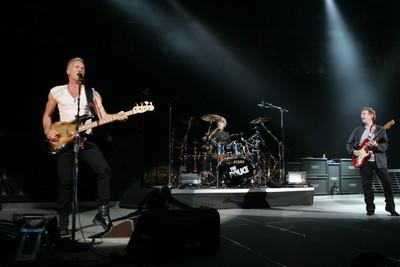Still Breathing

Sting believes in meaningful coincidences, he trusts in the natural order of things, even if it doesn’t always show the same faith in him.
Borrowing a page from Swiss psychologist Carl Jung, whose notions of a collective unconsciousness informed some of The Police’s later-period works, the philosophical singer/bassist with the sharp, pin-prick of a voice long has embraced the Zen world view of a stoned yoga instructor.
But as the face of The Police, Sting largely has been defined by tension and tumult, a kind of anxious friction that’s catalyzed a small but deep catalog of progressive pop with an emphasis on precision and nuance.
From the onset, The Police were characterized by a creative restlessness offset by an instrumental exactitude.
They were born on the fringes of the U.K. punk scene, but while a few of the group’s early tunes tapped into the energy and abandon of that sweaty lot, the band — rounded out by drummer Stewart Copeland and guitarist Andy Summers — elevated technique over tempestuousness, and their tunes became too diffuse and tightly honed to be filed next to anything by the Sex Pistols.
Perhaps the most punk thing about the band was how little attention it seemed to pay to traditional genre distinctions, guided by a creative impulsiveness that manifested itself in an international sound, colored by touches of reggae and world music that carved a distinct niche for the band on the airwaves in the late ’70 and early ’80s.
The band’s sound was intricate yet immediate, and because of this, The Police’s audience long has been as wide-ranging as the group’s repertoire, with everyone from mainstream pop fans to punk-weaned new wavers to prog-leaning longhairs digging into the band’s multihued tunes.
It’s this broad following that has given the group such sturdy legs after all these years, and why, after more than two decades since the band’s previous tour, its reunion jaunt this summer has been doing such strong business, selling out some stadiums in hours.
Already, the tour has grossed $102 million on sales of 900,000 tickets in America and taken in another $66 million overseas.
“It’s certainly going to be the tour of the year,” says Gary Bongiovanni, editor of concert industry trade publication Pollstar. “On a worldwide basis, I think it’s bigger than even the band might have hoped that it would be. It’s one of the few tours that’s going to be playing really large venues and selling them out.”
Of course, no Police reunion would be complete without its share of inner-band strife from this notoriously quarrelsome trio, and from the get go, some sparks seemed to fly after Copeland harshly critiqued the band’s tour-opening set in Vancouver, British Columbia, a few weeks back.
Writing on his Web site, Copeland branded the band’s performance “totally lame” and noted that Sting looked like a “petulant pansy” at one point.
Still, Copeland did add that the band laughed about its miscues rather than engaging in fisticuffs, a welcome break from the past.
And as for the concertgoers in attendance at the two Vancouver shows (one that was open to fan club members only), the rough edges didn’t seem to dull any of the band’s vigor.
“I know they missed some notes,” says Marino Specogna, 42, a Canadian Police fan who saw the band’s first two reunion sets, “but it was a great sound, a lively performance, everyone played their part great. They did slow some songs down — I figure to give themselves a bit of rest as they played for two hours.”
As their set length indicates, The Police’s catalog of hits is an extensive one, from inadvertent stalker anthems (“Every Breath You Take”) to politically charged missives (“Invisible Sun”) to sunny come-ons (“Every Little Thing She Does Is Magic”).
It’s a sound that’s aged well — in fact, it doesn’t seem to have aged much at all, namely because no one really has been able to duplicate the band’s idiosyncratic repertoire.
And this is what ultimately has endeared the band to so many.
Really, who can argue with The Police?
Perhaps only the band members themselves.